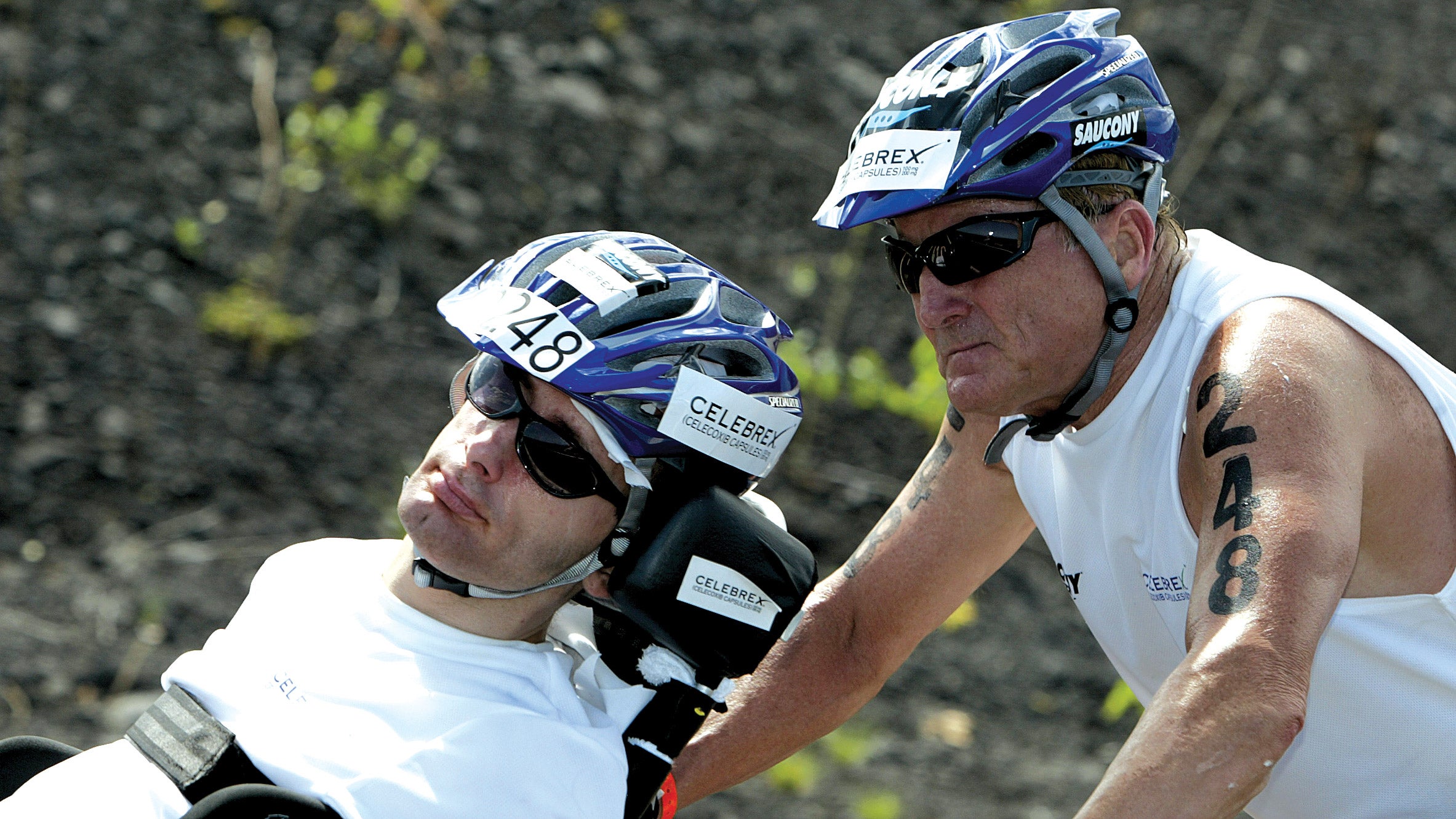From the Archives: From 5K To Ironman, Team Hoyt's Unbreakable Bond

The father-son duo Dick and Rick Hoyt inspired millions with their teamwork and tenacity. (Photo: John Segesta)
Editor’s note: Dick Hoyt has passed away at the age of 80. In honor of his memory, we’re sharing this article written by Ironman hall-of-fame member Bob Babbitt. It was originally published in the Nov./Dec. 2013 issue of Inside Triathlon magazine.
In 1962, Rick Hoyt was born with cerebral palsy. Eight months later, doctors told his parents that there wasn’t much hope for him since he couldn’t walk or talk, and their recommendation was to institutionalize him. “They told us that Rick would be a vegetable for the rest of his life,” remembered his father, Dick. “Fifty-one years later, Rick and I are still trying to figure out what type of vegetable he is.”
Obviously, a pretty active one. Since they became Team Hoyt and started running events together in 1977 when Dick was 37 years old, the father-and-son team has participated in more than 1,100 endurance events all over the world, including 70 marathons and 247 triathlons. Included in that number are six Ironman triathlons and 30 Boston Marathons. The kid the doctors felt should be institutionalized completed high school and graduated from Boston University in 1993 with a degree in special education.
“In the early years, people were not accepting of someone who was in a wheelchair,” Dick said. “I could tell they were uncomfortable around us, whether it was in a restaurant or at a road race.”
When they did their first road race together, it was because Rick wanted to help out a paralyzed lacrosse player. A five-mile run had been organized to raise money for the injured athlete, and Rick wanted to participate, which meant that Dick had to participate.
“At that time Rick had a really heavy wheelchair and I was running about three miles a week,” he said. “Everyone thought we’d run to the corner and back, but we ended up finishing the entire five miles and finished next to last. For the next two weeks, I was disabled. I was so sore I could barely walk.”
When they returned home after the race, Rick typed out, “Dad, when we run, I feel like my disability disappears.” “Rick created a sign for his chair that said ‘Free Bird’ on it,” says Dick. “I knew running was the start of a new adventure for us.”
Pretty soon Dick was winning his age group while pushing Rick. They ran 17 minutes for 5K, finished Boston in 2:58 and 2:59, and eventually ran in the 2:40s for the marathon. To train while Rick was at college, Dick would get a 94-pound bag of cement—Rick weighed 95 back then—put it in Rick’s racing chair and log the miles. “People thought I was crazy,” said Dick.
The next adventure was triathlon, which held its own challenges since Dick didn’t swim. “I bought a home on a lake so I could work on my swimming,” said Dick. “The first time I jumped in, I couldn’t go 15 feet. Every day I went a little bit farther.”
In 1989, Team Hoyt tackled the Hawaii Ironman. After pulling Rick in a raft through 2.4 miles in 1:54:06, they got on the bike. Their bike weighed 76 pounds, Rick weighed in at 125 and Dick was a lean and mean 175. Don’t try this at home. Dick was propelling a not-very-aerodynamic 376 pounds through the lava fields in 8:01:30 before pushing Rick to a 4:30:27 marathon to finish in an unfathomable time of 14:26:04.
At the end of the day, it’s not always important how a story starts, but how it turns out. They were honored in Boston in 1996 on the 100th anniversary of the event as Centennial Heroes, and there is now a bronze statue of Dick and Rick 400 yards from the start of the marathon in Hopkinton. The pair was inducted into the Ironman Hall of Fame in 2008, and they were honored at the ESPYs with the Jim Valvano Perseverance Award. Dick and Rick showcase every day the unbreakable bond between a father and his son.